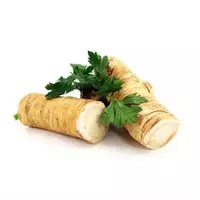Horse-radish

Here is a truly Russian plant. Most scientists have no doubt that horseradish appeared in Russia and only then spread to European countries. There were no difficulties for this, because horseradish is surprisingly unpretentious, grows quickly and reproduces easily.
In Europe, horseradish was initially treated carefully and only over time tried it and appreciated its unique taste. The Slavs used horseradish as a spicy seasoning and as a medicinal drug, endowing it with unique magical properties. In one of the books, horseradish is surprisingly poetically called "royal eyes. "
The benefits of horseradish
Currently, the healing properties of horseradish are confirmed by scientific research. This is due to the composition of the plant rhizomes. This includes vitamins B, C, carotene, in addition, mineral salts of many elements, carbohydrates, phytoncides and essential oils. In terms of vitamin C content, horseradish significantly exceeds the recognized leader in this indicator - lemon - and is slightly inferior to blackcurrant and rose hips.
The substance lysozyme, which is also contained in horseradish, has a strong bactericidal effect. Phytoncides have the ability to protect the human body from many infectious diseases. During hypothermia, horseradish fumes are used, which are applied to the feet and lower legs. Horseradish arouses appetite, contributes to maintaining vitality.
Horseradish has an extremely beneficial effect on the functioning of the gastrointestinal tract, contributes to improving digestion, so horseradish often accompanies very fatty and difficult to digest dishes. For a long time, the ointment prepared from this plant has been actively used to relieve rheumatic pains. As a medical remedy, horseradish is recommended for patients with chronic gastritis and inflammation of the kidneys.
Horseradish calorie content has an average value of 59 kcal. per 100 gr. product, but this, given that it is very difficult to eat a very large amount of horseradish. However, as an additive to pickles and marinades, horseradish is extremely popular. And which of us does not know the widespread snack "horseradish" in Russia, the name of which directly speaks of the main product included in its composition?
It should also be remembered that with long-term storage, the beneficial properties of horseradish are lost, so most likely, if you bought a jar of grated horseradish from the store, then you will simply get a spicy supplement to the prepared dishes, the benefits of horseradish in this case will be minimal. It is recommended to store freshly harvested horseradish no longer than 7 days.
The harm of horseradish
Despite the obvious benefit of horseradish, it should be consumed in very moderate amounts, since nevertheless this extremely acute seasoning and abuse of it can have a negative effect on the mucous membrane and on the operation of the stomach. The harm to horseradish is that it is able to increase blood pressure and can cause bleeding. Horseradish is contraindicated in pregnant women.
horseradish 59 kKal
Energy value of horseradish (Ratio of proteins, fats, carbohydrates - ju):
Proteins: 3.2 g (~ 13 kCal)
Fats: 0.4 g (~ 4 kCal)
Carbohydrates: 10.5g (~ 42kCal)
Energy ratio (bj | y): 22% | 6% | 71%
 Español
Español Français
Français Português
Português Русский
Русский 简体中文
简体中文 繁體中文
繁體中文 日本語
日本語 한국어
한국어 العربية
العربية Türkçe
Türkçe Қазақ
Қазақ Deutsch
Deutsch Italiano
Italiano Українська
Українська
